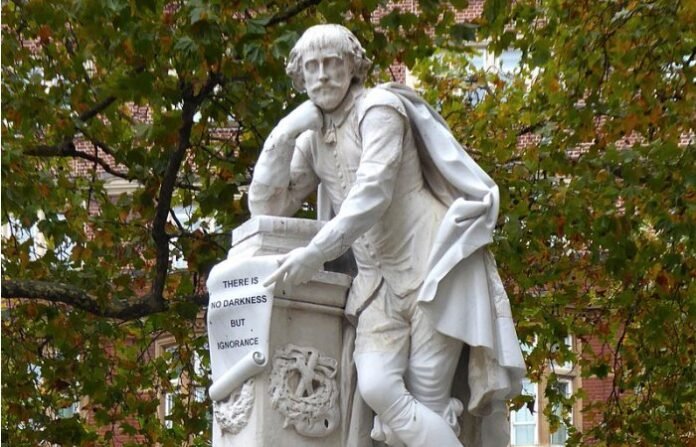Jan Bartek – AncientPages.com – Recent research has introduced new perspectives on the origins of a well-known insult directed at William Shakespeare, suggesting that it may have originated from one of his friends.
The term “upstart crow” has traditionally been considered the first literary jab at Shakespeare’s burgeoning fame, appearing in Greene’s Groatsworth of Wit, a pamphlet published in 1592 shortly after Robert Greene’s death. This insult depicted Shakespeare as an audacious actor-turned-playwright “beautified with our feathers,” influencing perceptions of his early career and relationships with other writers for centuries.
Shakespeare Statue in Leicester Square. Credit: Ethan Doyle White – CC BY-SA 4.0
However, recent findings by Professor Brett Greatley-Hirsch from the University of Leeds School of English, alongside Professor Andrew Hadfield at the University of Sussex and Dr. Rachel White at Durham University, propose that Thomas Nashe might be the true author behind this infamous critique. Nashe was another Elizabethan playwright and pamphleteer known for his incisive wit and provocative writing style, as well as potential collaborations with Shakespeare.
Utilizing a blend of detailed textual analysis and computational techniques typically employed in scientific research, Professor Greatley-Hirsch and his team revisited the authorship debate surrounding Greene’s Groatsworth of Wit. This topic has long intrigued scholars.
It is important to note that although Greene did not author the final version of the pamphlet, which was assembled after his death by his literary executor Henry Chettle, recent discoveries indicate that Chettle may have collaborated with Nashe. Nashe is suspected of having written the infamous “upstart crow” lines. This possibility adds an intriguing dimension to the insult: if Nashe indeed contributed, it implies that Shakespeare might have collaborated on Henry VI, Part One with someone who played a role in tarnishing his reputation.
“This discovery reshapes what we think we know about Shakespeare’s early reception and the literary rivalries of Renaissance London,” said Professor Greatley-Hirsch, a world leader in computational Shakespeare studies.
“It also highlights the power of digital tools to shed new light on longstanding literary puzzles—helping us to ask, and answer, questions that were previously out of reach. By using machine learning in this way, we are getting the computer to spot things that an ordinary human being simply can’t.”
There have long been questions regarding the authorship of the pamphlet, with notable academics such as Shakespeare scholar Professor Katherine Duncan-Jones proposing that Nashe might have contributed to parts of it. Recent analysis by a research team supports this theory.
Dr. White stated, “We have provided quantitative support to Professor Duncan-Jones’s qualitative judgment, as a careful scholar and sensitive reader of Shakespeare, that the ‘upstart Crow’ lines sound more like the work of Nashe. This part of the Groatsworth captures Nashe’s style, tone, and language perfectly, making it unlikely that this is imitation.”
Despite strong evidence pointing to Nashe as the author, a mystery remains about why he would publicly criticize in this manner. It is believed that he and Shakespeare either collaborated on 1 Henry VI or that Shakespeare revised some of Nashe’s earlier work.
“What we don’t know is whether Nashe was genuinely scornful of Shakespeare, dismissing him as a second-rate imitator, or whether he was stirring up controversy because it sells. Nashe liked taking on different identities in his writing and to play games about authorship, which may be what is happening here,” Professor Hadfield said in a press release.
Professor Greatley-Hirsch added, “Nashe was adamant that he had nothing to do with the Groatsworth, but he was also a trickster, so this kind of stunt certainly fits with his character.
“He was one of the so-called ‘university wits’ thought to have looked down on Shakespeare who had a provincial education and had not been to university.”
The study was published in Shakespeare Quarterly
Written by Jan Bartek – AncientPages.com Staff Writer








